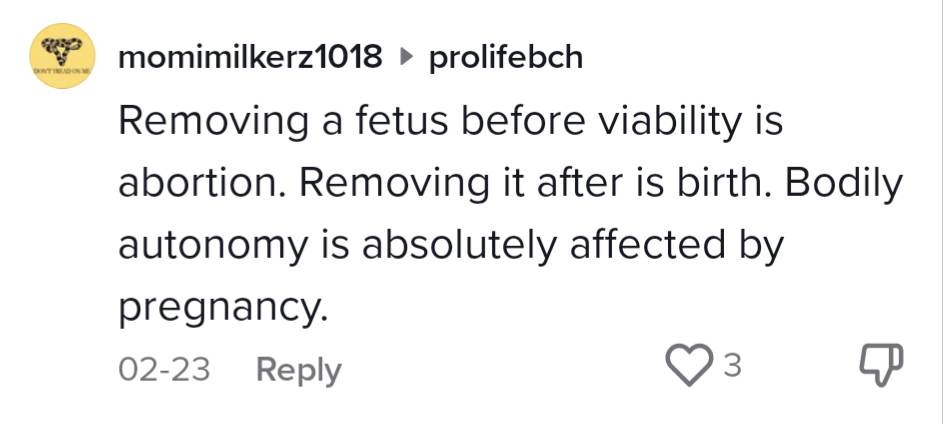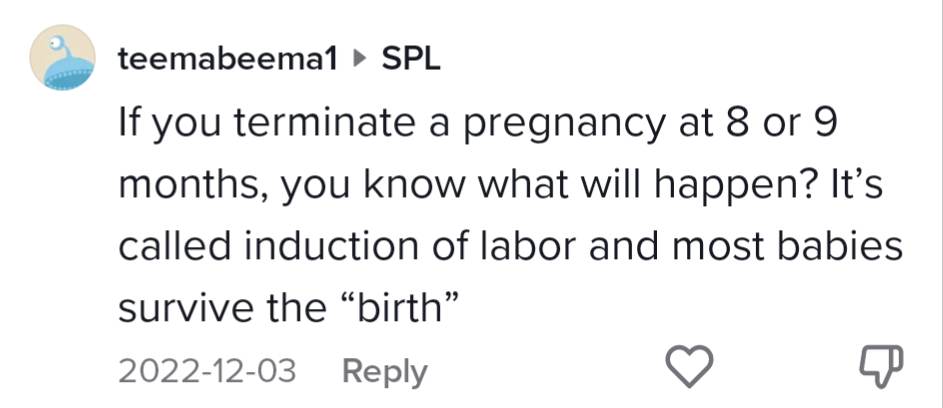Aborting a healthy fetus at 31 weeks
There are several places in the United States where it is legal to abort a viable fetus for non-medical reasons.
By this I mean it’s legal for a woman (1) who is 24 weeks pregnant or further (2) to undergo a procedure that has the intent and result of killing the fetus (3) when there is no medical emergency involved for either woman or child.
Some pro-choicers believe post-viability abortion is just (live) birth.
The idea that post-viability abortions are only ever done in the event of medical emergencies is one of the more persistent pro-choice myths. At Secular Pro-Life, we’ve focused on debunking claims such as “Nearly all of the parents who do [get later abortions] are grappling with devastating diagnoses” or “…abortions happen later in pregnancy — almost always because a woman’s health or life is at risk, or the pregnancy is no longer viable.” These are claims that (1) acknowledge the existence of a procedure that ends the life of a fetus late in pregnancy, but (2) deny such procedures are done outside of medical emergencies.
[Read more – There is no quantifiable data to support the idea that all or even most later abortions are medically necessary.]
But recently I’ve seen an uptick in the inverse: claims that (1) acknowledge the existence of later abortions for reasons outside of medical emergencies, but (2) deny that these “abortions” end the life of the fetus. In other words, some pro-choice people are claiming abortion after viability is just (live) birth.
Their idea is that, yes, there are places in the country where people will “abort” your viable fetus, but pro-lifers are misunderstanding the situation. In these cases “abort” simply means induce labor, and if the fetus is viable, she will be born alive and will most likely survive. The people promoting this idea believe “abortion” means only “termination of pregnancy,” and so an act is an abortion whether the fetus lives or dies. They believe that pro-lifers have tried to stigmatize abortion by associating it with an act of killing, but that this association is anti-choice propaganda. Examples:





Post-viability abortion involves fetal demise first, labor induction second.
The above comments are, of course, not true. In her Boston Review article “Why I Provide Abortions,” Christine Henneberg puts it bluntly:
If a woman decides to proceed with an abortion after twenty-four weeks, she must accept the terms: that she will deliver a baby, and that baby will be dead.
Christine Henneberg
Similarly, researchers recently reviewed 338 abortions (range of 24-34 weeks gestation) in which the abortion providers injected lidocaine to stop the fetal heart prior to labor and delivery. Their peer-reviewed article concluded:
Transabdominal intrafetal lidocaine is a safe and effective method of inducing fetal demise after 24 weeks.
“Transabdominal intrafetal lidocaine to induce fetal demise prior to abortion at 24 weeks or later,” Contraception, Reeves et al
Additionally, women have spoken up about their late abortions for non-medical reasons. The abortion subreddit has one such account: “no one to talk to about my induction abortion.” The author didn’t learn she was pregnant until 31 weeks, and her local clinic referred her to a clinic in New Mexico (one of the states with no gestational limits on abortion) to get an abortion. In her post, the author repeatedly underscores the trauma of birthing a dead child. For example:
the first day was for the brief counseling session, educational session/group therapy meeting, ultrasound, and fetal euthanization injection. that last bit was pretty upsetting. before it happened, i held my small protuberance and cried, and said over and over: “i’m so sorry baby. even though i’ll never hold you in my arms, i will hold you forever in my heart”
after a few pushes it was all over, but i couldn’t help but feel the size of the pregnancy i was passing. and that’s why, a month later, i’m still in tears.
i always thought that, if i had to, i’d be fine with having an abortion because it’d be a “take two pills and wear a maxi pad for a couple weeks” kind of situation. i never knew that i would have to euthanize, go into labor with, and fully deliver, a viable fetus. a baby. my baby.
Post-viability abortion is not premature live birth. It is a procedure with the intent and result of a dead child, and it is legal in multiple locations in the country.
[Read more – My appointment for an abortion at 28 weeks]



